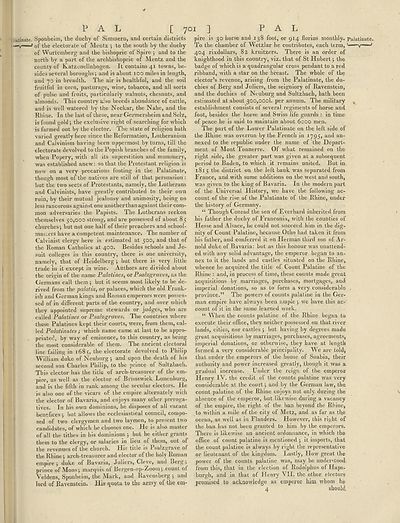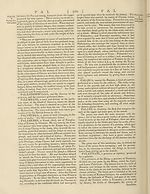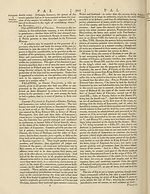Encyclopaedia Britannica > Volume 15, NIC-PAR
(777) Page 701
Download files
Complete book:
Individual page:
Thumbnail gallery: Grid view | List view

PAL [ 7°i ] PAL
ei
liatinate. Sponheim, the duchy of Simmern, and certain districts
v—J of the electorate of Mentz ; to the south by the duchy
of Wurtemberg and the bishopric oi Spire j and to the
north by a part of the archbishopric of Mentz and the
county of Katzenellnbogen. It contains 41 towns, be¬
sides several boroughs; and is about 100 miles in length,
and 70 in breadth. The air is healthful, and the soil
fruitful in corn, pasturage, wine, tobacco, and all sorts
of pulse and fruits, particularly walnuts, chesnuts, and
almonds. This country also breeds abundance of cattle,
and is well watered by the Neckar, the Nahe, and the
Rhine. In the last of these, near Germersheim and Selz,
is found gold; the exclusive right of searching for which
is farmed out by the elector. The state of religion hath
varied greatly here since the Reformation, Lutheranism
and Calvinism having been uppermost by turns, till the
electorate devolved to the Popish branches of the family,
when Popery, with all its superstition and mummery,
was established anew: so that the Protestant religion is
now on a very precarious footing in the Palatinate,
though most of the natives are still of that persuasion:
but the two sects of Protestants, namely, the Lutherans
and Calvinists, have greatly contributed to their own
ruin, by their mutual jealousy and animosity, being no
Jess rancorous against one another than against their com¬
mon adversaries the Papists. The Lutherans reckon
themselves 50,000 strong, and are possessed of about 85
churches; but not one half of their preachers and school-
masierS have a competent maintenance. The number of
Calvinist clergy here is estimated at 500» an(^
the Roman Catholics at 400. Besides schools and Je¬
suit colleges in this country, there is one university,
namely, that of Heidelberg ; but there is very little
trade in it except in wine. Authors are divided about
the origin of the name Palatines, orPsafegraves, as the
Germans call them ; but it seems most likely to be de¬
rived from the palatia, or palaces, which the old Frank¬
ish and German kings and Roman emperors were posses¬
sed of in different parts of the country, and over which
they appointed supreme stewards or judges, who are
called Palatines or Psalzgraves. The countries where
these Palatines kept their courts, were, from them, cal¬
led Palatinates ; which name came at last to be appro¬
priated, by way of eminence, to this country, as being
the most considerable of them. The ancient electoral
line failing in 168 1;, the electorate devolved to Philip
William duke of Neuburg ; and upon the death of his
second son Charles Philip, to the prince of Sultzbach.
This elector has the title of arch-treasurer of the em¬
pire, as well as the elector of Brunswick Lunenburg,
and is the fifth in rank among the secular electors. He
is also one of the vicars of the empire alternately with
the elector of Bavaria, and enjoys many other preroga¬
tives. In his own dominions, he disposes of all vacant
benefices ; but allows the ecclesiastical council, compo¬
sed of two clergymen and two laymen, to present two
candidates, of which he chooses one. He is also master
of all the tithes in his dominions ; but he either grants
them to the clergy, or salaries in lieu of them, out of
the revenues of the church. His title is ! salzgrave of
the Rhine; arch-treasurer and elector of the holy Roman
empire; duke of Bavaria, Juliers, Cleve, and Berg;
prince of Mons; marquis of Bergen-op-Zoom; count of
Veldens, Sponheim, the Mark, and Ravensberg ; and
lord of Ravenstein. His quota to the army of the em¬
pire is 30 horse and 138 foot, or 914 florins monthly. Palatinate,
To the chamber of Wetzlar he contributes, each term, 1 1 ■— v 1
404 rixdollars, 82 kruitzers. There is an order of
knighthood in this country, viz. that of St Hubert; the
badge of which is a quadrangular cross pendant to a red
ribband, with a star on the breast. The whole of the
elector’s revenue, arising from the Palatinate, the du¬
chies of Berg and Juliers, the seigniory of Ravenstein,
and the duchies of Neuburg and Sultzbach, hath been
estimated at about 300,000k per annum. The military
establishment consists of several regiments of horse and
foot, besides the horse and Swiss life guards : in time
of peace he is said to maintain about 6000 men.
The part of the Lower Palatinate on the left side of
the Rhine was overrun by the French in 1795, and an¬
nexed to the republic under the name of the Depart¬
ment of Mont Tonnerre. Of what remained on the
right side, the greater part was given at a subsequent
period to Baden, to which it remains united. But in
1815 the district on the left bank was separated from
France, and with some additions on the west and south,
was given to the king of Bavaria. In the modern part
of the Universal History, we have the following ac¬
count of the rise of the Palatinate of the Rhine, under
the history of Germany.
“ Though Conrad the son of Everhard inherited from
his father the duchy of Franconia, with the counties of
Hesse and Alsace, he could not succeed him in the dig¬
nity of Count Palatine, because Otho had taken it from
his father, and conferred it on Herman third son of Ar¬
nold duke of Bavaria: but as this honour was unattend¬
ed with any solid advantage, the emperor began to an¬
nex to it the lands and castles situated on the Rhine,
whence he acquired the title of Count Palatine of the
Rhine : and, in process of time, these counts made great
acquisitions by marriages, purchases, mortgages, and
imperial donations, so as to form a very considerable
province.” The powers of counts palatine in the Ger¬
man empire have always been ample; we have this ac¬
count of it in the same learned work.
“ When the counts palatine of the Rhine began to
execute their office, they neither possessed on that river
lands, cities, nor castles ; but having by degrees made
great acquisitions by marriages, purchases, agreements,
imperial donations, or otherwise, they have at length
formed a very considerable principality. We are told,
that under the emperors of the house of Suabia, their
authority and power increased greatly, though it was a
gradual increase. Under the reign of the emperor
Henry IV. the credit of the counts palatine was very
considerable at the court; and by the German law, the
count palatine of the Rhine enjoys not only during the
absence of the emperor, but likewise during a vacancy
of the empire, the right of the ban beyond the Rhine,
to within a mile of the city of Metz, and as far as tl\e
ocean, as well as in Flanders. However, this right of
the ban has not been granted to him by the emperors.
There is likewise an ancient ordonnance, in which the
office of count palatine is mentioned ; it imports, that
the count palatine is always by right the representative
or lieutenant of the kingdom. Lastly, How great the
power of the counts palatine was, may be understood
from this, that in the election of Rodolphus of Haps-
burgh, and in that of Henry VII. the other electors
promised to acknowledge as emperor him whom he
4 should
ei
liatinate. Sponheim, the duchy of Simmern, and certain districts
v—J of the electorate of Mentz ; to the south by the duchy
of Wurtemberg and the bishopric oi Spire j and to the
north by a part of the archbishopric of Mentz and the
county of Katzenellnbogen. It contains 41 towns, be¬
sides several boroughs; and is about 100 miles in length,
and 70 in breadth. The air is healthful, and the soil
fruitful in corn, pasturage, wine, tobacco, and all sorts
of pulse and fruits, particularly walnuts, chesnuts, and
almonds. This country also breeds abundance of cattle,
and is well watered by the Neckar, the Nahe, and the
Rhine. In the last of these, near Germersheim and Selz,
is found gold; the exclusive right of searching for which
is farmed out by the elector. The state of religion hath
varied greatly here since the Reformation, Lutheranism
and Calvinism having been uppermost by turns, till the
electorate devolved to the Popish branches of the family,
when Popery, with all its superstition and mummery,
was established anew: so that the Protestant religion is
now on a very precarious footing in the Palatinate,
though most of the natives are still of that persuasion:
but the two sects of Protestants, namely, the Lutherans
and Calvinists, have greatly contributed to their own
ruin, by their mutual jealousy and animosity, being no
Jess rancorous against one another than against their com¬
mon adversaries the Papists. The Lutherans reckon
themselves 50,000 strong, and are possessed of about 85
churches; but not one half of their preachers and school-
masierS have a competent maintenance. The number of
Calvinist clergy here is estimated at 500» an(^
the Roman Catholics at 400. Besides schools and Je¬
suit colleges in this country, there is one university,
namely, that of Heidelberg ; but there is very little
trade in it except in wine. Authors are divided about
the origin of the name Palatines, orPsafegraves, as the
Germans call them ; but it seems most likely to be de¬
rived from the palatia, or palaces, which the old Frank¬
ish and German kings and Roman emperors were posses¬
sed of in different parts of the country, and over which
they appointed supreme stewards or judges, who are
called Palatines or Psalzgraves. The countries where
these Palatines kept their courts, were, from them, cal¬
led Palatinates ; which name came at last to be appro¬
priated, by way of eminence, to this country, as being
the most considerable of them. The ancient electoral
line failing in 168 1;, the electorate devolved to Philip
William duke of Neuburg ; and upon the death of his
second son Charles Philip, to the prince of Sultzbach.
This elector has the title of arch-treasurer of the em¬
pire, as well as the elector of Brunswick Lunenburg,
and is the fifth in rank among the secular electors. He
is also one of the vicars of the empire alternately with
the elector of Bavaria, and enjoys many other preroga¬
tives. In his own dominions, he disposes of all vacant
benefices ; but allows the ecclesiastical council, compo¬
sed of two clergymen and two laymen, to present two
candidates, of which he chooses one. He is also master
of all the tithes in his dominions ; but he either grants
them to the clergy, or salaries in lieu of them, out of
the revenues of the church. His title is ! salzgrave of
the Rhine; arch-treasurer and elector of the holy Roman
empire; duke of Bavaria, Juliers, Cleve, and Berg;
prince of Mons; marquis of Bergen-op-Zoom; count of
Veldens, Sponheim, the Mark, and Ravensberg ; and
lord of Ravenstein. His quota to the army of the em¬
pire is 30 horse and 138 foot, or 914 florins monthly. Palatinate,
To the chamber of Wetzlar he contributes, each term, 1 1 ■— v 1
404 rixdollars, 82 kruitzers. There is an order of
knighthood in this country, viz. that of St Hubert; the
badge of which is a quadrangular cross pendant to a red
ribband, with a star on the breast. The whole of the
elector’s revenue, arising from the Palatinate, the du¬
chies of Berg and Juliers, the seigniory of Ravenstein,
and the duchies of Neuburg and Sultzbach, hath been
estimated at about 300,000k per annum. The military
establishment consists of several regiments of horse and
foot, besides the horse and Swiss life guards : in time
of peace he is said to maintain about 6000 men.
The part of the Lower Palatinate on the left side of
the Rhine was overrun by the French in 1795, and an¬
nexed to the republic under the name of the Depart¬
ment of Mont Tonnerre. Of what remained on the
right side, the greater part was given at a subsequent
period to Baden, to which it remains united. But in
1815 the district on the left bank was separated from
France, and with some additions on the west and south,
was given to the king of Bavaria. In the modern part
of the Universal History, we have the following ac¬
count of the rise of the Palatinate of the Rhine, under
the history of Germany.
“ Though Conrad the son of Everhard inherited from
his father the duchy of Franconia, with the counties of
Hesse and Alsace, he could not succeed him in the dig¬
nity of Count Palatine, because Otho had taken it from
his father, and conferred it on Herman third son of Ar¬
nold duke of Bavaria: but as this honour was unattend¬
ed with any solid advantage, the emperor began to an¬
nex to it the lands and castles situated on the Rhine,
whence he acquired the title of Count Palatine of the
Rhine : and, in process of time, these counts made great
acquisitions by marriages, purchases, mortgages, and
imperial donations, so as to form a very considerable
province.” The powers of counts palatine in the Ger¬
man empire have always been ample; we have this ac¬
count of it in the same learned work.
“ When the counts palatine of the Rhine began to
execute their office, they neither possessed on that river
lands, cities, nor castles ; but having by degrees made
great acquisitions by marriages, purchases, agreements,
imperial donations, or otherwise, they have at length
formed a very considerable principality. We are told,
that under the emperors of the house of Suabia, their
authority and power increased greatly, though it was a
gradual increase. Under the reign of the emperor
Henry IV. the credit of the counts palatine was very
considerable at the court; and by the German law, the
count palatine of the Rhine enjoys not only during the
absence of the emperor, but likewise during a vacancy
of the empire, the right of the ban beyond the Rhine,
to within a mile of the city of Metz, and as far as tl\e
ocean, as well as in Flanders. However, this right of
the ban has not been granted to him by the emperors.
There is likewise an ancient ordonnance, in which the
office of count palatine is mentioned ; it imports, that
the count palatine is always by right the representative
or lieutenant of the kingdom. Lastly, How great the
power of the counts palatine was, may be understood
from this, that in the election of Rodolphus of Haps-
burgh, and in that of Henry VII. the other electors
promised to acknowledge as emperor him whom he
4 should
Set display mode to:
![]() Universal Viewer |
Universal Viewer | ![]() Mirador |
Large image | Transcription
Mirador |
Large image | Transcription
Images and transcriptions on this page, including medium image downloads, may be used under the Creative Commons Attribution 4.0 International Licence unless otherwise stated. ![]()
| Encyclopaedia Britannica > Encyclopaedia Britannica > Volume 15, NIC-PAR > (777) Page 701 |
|---|
| Permanent URL | https://digital.nls.uk/192591799 |
|---|
| Attribution and copyright: |
|
|---|
| Shelfmark | EB.11 |
|---|---|
| Description | Ten editions of 'Encyclopaedia Britannica', issued from 1768-1903, in 231 volumes. Originally issued in 100 weekly parts (3 volumes) between 1768 and 1771 by publishers: Colin Macfarquhar and Andrew Bell (Edinburgh); editor: William Smellie: engraver: Andrew Bell. Expanded editions in the 19th century featured more volumes and contributions from leading experts in their fields. Managed and published in Edinburgh up to the 9th edition (25 volumes, from 1875-1889); the 10th edition (1902-1903) re-issued the 9th edition, with 11 supplementary volumes. |
|---|---|
| Additional NLS resources: |
|

